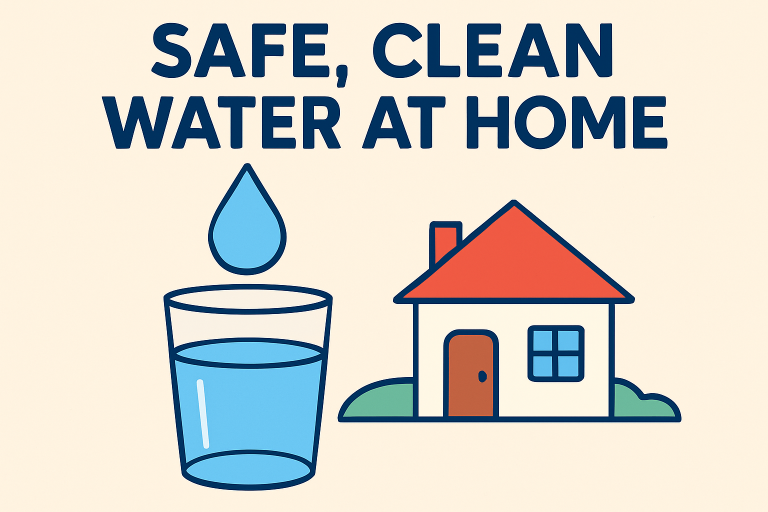Lifestyle
Crystal Clear: Simple Yet Powerful Solutions for Ensuring Pristine Drinking Water in Your Home

Introduction
Ensuring your home has access to clean and safe drinking water is one of the most important steps toward protecting your family’s health. While modern water treatment facilities play a significant role in purifying municipal water, household solutions are essential for addressing unique challenges and contaminants. Whether you rely on well water or a public supply, tailored strategies can help safeguard your water. Addressing these needs early and consulting with expert water treatment systems Gaithersburg professionals empowers you to make informed decisions and implement long-term solutions for healthy living.
Even something as simple as routine water quality testing and basic at-home maintenance can dramatically elevate your water’s purity and taste. By taking a proactive approach, you aren’t just improving the taste of your tap water; you’re helping to prevent health issues, plumbing damage, and unnecessary waste. This guide explores practical and budget-friendly solutions every homeowner can use to achieve cleaner, safer water.
Test Your Water Quality
The first step in securing clean household water is establishing a comprehensive understanding of what’s flowing from your tap. Regional pollutants, corroded pipes, agricultural runoff, or local construction activities can contaminate water. To ensure you’re addressing the right issues, a water quality test is essential. Home water testing kits are affordable, easy to use, and capable of detecting a wide range of contaminants, including chlorine, iron, lead, pesticides, and bacteria. For those seeking a deeper analysis, especially well owners or those living in older homes, hiring a professional testing service provides a more thorough inspection, sometimes pinpointing trace contaminants that kits might miss.
Results from these tests reveal specific health risks, like elevated lead or bacterial contamination, making it easier to choose appropriate treatment methods and avoid guesswork.

Install Water Filtration Systems
With water testing results in hand, you can make informed choices on filtration systems that best match your needs and budget. Here are four popular options:
- Faucet Filters: An excellent entry-level solution, these filters attach directly to your kitchen tap. They’re particularly effective against chlorine, lead, cysts, and other impurities, and are simple to install; no special tools are required.
- Pitcher Filters: These portable devices are ideal for individuals who rent or prefer maximum convenience. Most use activated carbon to eliminate bad tastes and odors, offering improved water clarity at a low upfront cost.
- Under-Sink Filters: More robust than faucet or pitcher filters, under-sink systems operate at the point of use and can address a wider array of contaminants, including heavy metals and VOCs. Many offer a dedicated spigot, providing instant access to safe, filtered drinking water.
- Whole-House Filters: Installed where water enters the home, these comprehensive systems protect plumbing, appliances, and every tap. They’re especially valuable for households concerned about contaminants beyond drinking water, such as chemicals or sediment that can affect showers and washing machines.
Maintain Your Plumbing
Even with filtration, maintaining a clean and uncontaminated water supply relies heavily on the integrity of your plumbing system. Over time, pipes, especially those made from older materials, such as lead or galvanized steel, can corrode or degrade, leaching metals and debris into your water. Conduct visual inspections of exposed pipes for rust, discoloration, or visible leaks. Pay special attention to fixtures in kitchens, laundry rooms, and bathrooms, as these see frequent use and are more prone to wear.
Upgrade Outdated Fixtures
If you spot corrosion, consider replacing fixtures and pipes with modern, lead-free alternatives. Additionally, ensure your water heater is set at or above 120°F to kill bacteria such as Legionella, which helps improve both water quality and safety.
Adopt Eco-Friendly Practices
Sustainable lifestyles play a powerful role in maintaining water purity. Simple eco-friendly habits can prevent harmful substances from ever entering your water supply:
- Use Natural Cleaning Products: Replace harsh chemicals with biodegradable or hypoallergenic alternatives. This reduces the risk of chemical runoff leaching back into drinking water sources and keeps your plumbing free from corrosive buildup.
- Proper Waste Disposal: Never flush medicines, oil, paint, or hazardous substances down drains or toilets. Instead, utilize municipal take-back programs or local hazardous waste collection events to dispose of these items safely and responsibly. This protects local waterways, wildlife, and your drinking supply.
- Conserve Water: Installing low-flow faucets, toilets, and showerheads, and promptly fixing leaks, saves thousands of gallons each year. Not only does this limit water waste, but it also reduces the burden on local treatment facilities and groundwater reserves.
Regularly Maintain Water Systems
Ongoing maintenance is crucial for maintaining continuous water quality. Filter cartridges should be replaced at the intervals recommended by the manufacturer, typically every three to six months, depending on usage and water conditions. Regularly clean faucet aerators, showerheads, and other fixtures to remove sediment buildup and mineral deposits. Periodically drain and flush your water heater to remove scale and bacteria-laden sediment, which can accumulate over time and affect both efficiency and water quality. If you notice a change in the taste, color, or smell of the water, investigate further and take appropriate action.
Proactive care not only extends the life of your equipment but also ensures your family’s water remains clean, fresh, and safe every day.
Implementing these straightforward solutions empowers you to take control of your home’s water quality, support better long-term health, and contribute to a more sustainable future for all.
